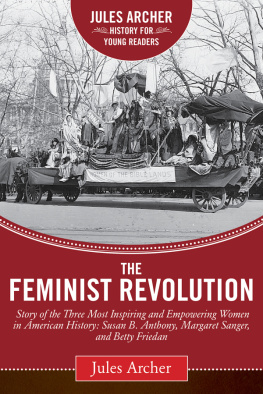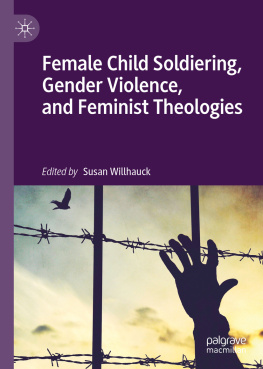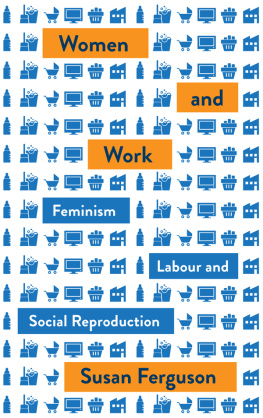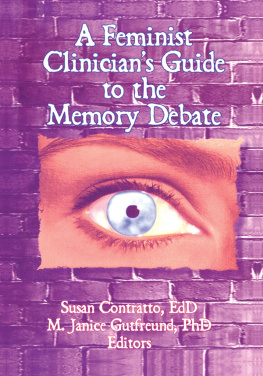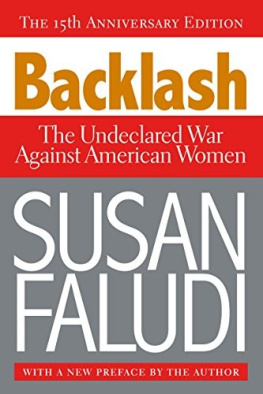Thank you for buying this ebook, published by NYU Press.
Sign up for our e-newsletters to receive information about forthcoming books, special discounts, and more!
Sign Up!
About NYU Press
A publisher of original scholarship since its founding in 1916, New York University Press Produces more than 100 new books each year, with a backlist of 3,000 titles in print. Working across the humanities and social sciences, NYU Press has award-winning lists in sociology, law, cultural and American studies, religion, American history, anthropology, politics, criminology, media and communication, literary studies, and psychology.
FEMINIST NIGHTMARES
FEMINIST NIGHTMARES
WOMEN AT ODDS
Feminism and the Problem of Sisterhood
EDITED BY
SUSAN OSTROV WEISSER
AND
JENNIFER FLEISCHNER
NEW YORK UNIVERSITY PRESS
New York and London
1994 by New York University
All rights reserved
Library of Congress Cataloging-in-Publication Data
Feminist nightmares : women at odds : feminism and the problem of
sisterhood / edited by Susan Ostrov Weisser and Jennifer Fleischner.
p. cm.
Includes bibliographical references and index.
ISBN 0-8147-2619-4.ISBN 0-8147-2620-8 (pbk.)
I. Feminism. 2. FeminismMoral and ethical aspects.
3. FeminismUnited States. I. Weisser, Susan Ostrov.
II. Fleischner, Jennifer.
HQ1190.F4616 1994
305.42dc2o 94-26606
CIP
New York University Press books are printed on acid-free paper,
and their binding materials are chosen for strength and durability.
Manufactured in the United States of America
10 9 8 7 6 5 4 3 2 1
To my children, Cyble, Amanda, and Billy Weisser
To my sister, Judith Mary Fleischner
CONTENTS
Susan Ostrov Weisser and Jennifer Fleiscbner
Daphne Patai
Devoney Looser
Manisha Sinha
The Color Purple Tuzyline Jita Allan
Jennifer Shaddock
Jennifer Fleischner
Rosaria Champagne
Linda C. McClain
E. Ann Kaplan
Judith R. Baskin
William Thompson
Nancy Ries
Susan Ostrov Weisser
Linda Alcoff
Nanette Funk
Eileen Gillooly
Robin Anne Reid
Muriel Dimen
ACKNOWLEDGMENTS
The idea for this book grew from a panel chaired by Susan Ostrov Weisser several years ago at the Northeast Modern Language Association, entitled Feminist Nightmares: Women against Women. Jennifer Fleischner was one of the participants in the panel. The room in which the 8:00 A.M. session took place was packed, and the heat and interest of the response from the audience were gratifying and thought-provoking: clearly, we felt, here was a subject begging to be explored further. During the ride home, it occurred to one or both of us (we no longer remember which one) to use the panel as a basis for a collection that would put the questions of sisterhood before a wider audience.
Since then we have worked together in ways that suggest the possibili ties and difficulties of womens relations with each other. We began with long talks over coffee, during which the personal, the professional, and the political merged seamlessly. Later, when Jennifer began a residence at Harvard University as a Mellon Faculty Fellow, ideas and sentences flew back and forth via fax and phone. During the year-long collaboration, mutual sympathy and respect helped us to work out those disagreements and conflicting interests inevitable to a joint project. In the end we developed ways of listening to and learning from each other that have both enriched our individual work and deepened our friendship. Although our book uses experience to contest an unquestioned ideal of sisterhood, our experience leaves us wanting to join force again.
We are grateful to our contributors, whose interests and ideas broadened our own perspectives. We would also like to thank those friends and colleagues who generously offered advice and suggestions, especially Deborah Dorfman, Eugene H. Roth, Karsten Struhl, and Eleanor Skoller. Karla Jay recommended our proposal to Niko Pfund, editor-in-chief at NYU Press, whose enthusiasm for our project never flagged. Laura Reitano gave extra time way beyond the call of duty. Finally, special thanks are due to Paul Mattick, Jr., for his careful and skilled readings.
INTRODUCTION
SUSAN OSTROV WEISSER AND JENNIFER FLEISCHNER
Though all women are women, no woman is only a woman
Elizabeth Spelman, The Inessential Woman
During the early stages of soliciting essays for this collection, one of the editors encountered the following reaction: This is a book that shouldnt be written. Feminists should concentrate on how men oppress women, not how bad women are to each other. The very hostility and vigor of the objection to examining women at odds, suggesting that this is a book whose subject touches a nerve, convinced us that such a book ought to be writtenand written by feminists.
We do not wish to open the subject of whether women think or act against other women as a question to be answered simply, as a matter of relocating enemies, nor, above all, as a diatribe against feminismvery much to the contrary. The continuing efficacy of feminism as an activist movement depends precisely on its ability to face the ways in which gender identification may be at odds with other modes of identification, say, those grounded in race, class, nationality, or religion. No collective identity based on these, or other, categories can be said to account wholly for each individuals sense of her world. While a common potential for abuse or oppression might unite all women, their diverse locations and situations in the world frequently lead, not only most obviously to differences in the quantity and quality of that abuse, but also to conditions in which the oppressed can themselves be oppressors.
By providing the conceptual tools to map out who we are and want to be, the awareness of difference has been an important originating idea in feminism. But this book seeks to address a difference more often than not obscured in the rhetoric of feminist theory: the differences among women themselves, and specifically those differences born of an inequality in power relations. Academic feminism has relied to such an extent on the theory of the social construction of difference that contemplating a whole substratum of power differentials within the oppressed group which are not easily eradicated is particularly threatening. Thus while differences between men and women have been a primary focus for feminists and nonfeminists, the problematics of the relations between women has only recently begun to be addressed.
To engage the question of differential power relations among women is to encounter a deep division within feminism itself over the very meaning of the key term woman, i.e., its efficacy as a basis of political criticism and change. One important branch of feminism with its roots in a long tradition, that of the cultural or radical feminists, is that there is in fact an authentic female identity based on the shared experience of the biologically female body. Whatever inequalities may exist among women, Luce Irigaray has written, they all undergo, even without clearly realising it, the same oppression, the same exploitation of their body, the same denial of their desire. As Irigaray continues, womens consciousness of their own common experience as women is what allows that experience to be politicized into feminism.




